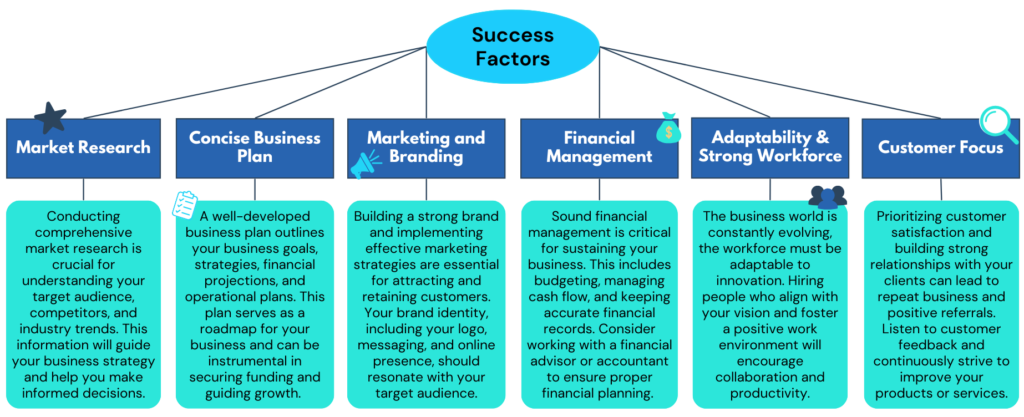
Business Development Consultant’s Guide: Pros and Cons of Starting a Business
At DevDefy, we’ve worked with a variety of startups, giving us insight into both the advantages and challenges of entrepreneurship. As a business development consultant, we aim to provide you with valuable knowledge about starting your own company. In this post, we will discuss the pros and cons of starting a business to help you navigate your entrepreneurial journey effectively.
The Impact of A Start Up
Starting a business is a significant undertaking that requires careful planning. According to the Small Business Administration, small businesses comprise 99.9% of all U.S. businesses and employ nearly half of the private workforce.
Entrepreneurship offers flexibility, autonomy, and potential financial rewards. However, it also comes with risks, including economic instability and intense competition.
The landscape has evolved with technology, making it easier to start businesses online. For example, platforms like Shopify or Etsy allow entrepreneurs to launch e-commerce stores with minimal initial investment. In addition, remote work and digital tools have lowered barriers for aspiring business owners.
7 Pros to Consider in Your Decision-Making
Independence and Autonomy
Becoming your own boss is a key motivator for starting a business. As a business development consultant, you have control over business decisions, which allows for creativity and innovation.
Potential for Financial Gain
Personal Fulfillment and Passion
Flexibility and Work-Life Balance
Running your own business offers more flexibility in terms of working hours and location. You can adjust your work schedule around your personal life.
Innovation and Creativity
Control Over Business Culture
As a business owner, you can shape the culture of your company, creating a work environment that reflects your values and mission.
Networking and Relationship Building
7 Cons to Consider in Your Decision-Making
Financial Risk and Uncertainty
Time Commitment and Workload
Responsibility and Stress
Market Competition
Competitive markets pose challenges for new businesses. With proper market analysis and strategic planning, you can better differentiate your business from established players.
Regulatory and Legal Hurdles
Navigating regulations and legal requirements can be difficult. Partnering with a business development service helps manage these challenges effectively.
Unpredictable Income
Unlike a salaried job, business revenue can fluctuate, particularly in the early stages, making financial stability a challenge.
RIsk of Failure
The risk of business failure is high, but understanding your market and planning carefully can increase your chances of success.
How can you succeed in a world full of risk?
Starting a business in today’s unpredictable world isn’t just about having a brilliant idea—it’s about learning how to handle risks effectively. While taking risks can lead to amazing opportunities, it also means facing some tough challenges. To really succeed as an entrepreneur, you need to understand both the potential rewards and the obstacles you’ll encounter. Here’s how you can navigate the ups and downs of the start-up world and turn risks into successes.
With some dedication and the success factors below, you can leverage the cons we’ve listed in the previous section to succeed in your start-up business.

Tech Start Ups that Prevailed

Notion Notion began as a simple note-taking app but quickly evolved into an all-in-one workspace. With the guidance of business development consultants, Notion has successfully grown, achieving a valuation of $10 billion.

UiPath UiPath began as a small automation company and grew into a leader in the tech space. Their success is largely due to their focus on scaling through strategic partnerships and innovation.

Figma Figma, a collaborative design tool, has become a key player in the design industry, and their focus on business development specialists allowed them to grow rapidly, with a valuation of $40 billion as of 2024.
Start Up Success by Industry
Market Research is a prime factor in determining whether you will be successful. With this being said, here’s an overview of success rates and key data for startups across various industries:
Technology
E-Commerce
Health And Wellness
Health startups face challenges due to regulatory requirements but have a 15% success rate. Many rely on business development services for navigating complex regulations.
Food And Beverage
- Success Rate: The National Restaurant Association reports that about 60% of new restaurants fail within the first year, and approximately 80% close within five years. However, this data is more specific to traditional restaurants rather than startups offering innovative food and beverage solutions.
- Notable Factors: Food and beverage startups can benefit from trends such as plant-based diets and sustainability but face high competition and challenges related to supply chain management and consumer preferences.
Green And Sustainable Businesses
- Success Rate: Startups focusing on sustainability and green technologies generally have a success rate of about 25% after five years. This is bolstered by increasing consumer demand for eco-friendly products and government incentives for sustainable practices.
- Notable Factors: Success in this industry often depends on innovation and the ability to effectively communicate the environmental benefits of their products or services.
Finance And Fintech
- Success Rate: According reports as of 2022, fintech startups have a success rate of approximately 20% over a five-year period. The industry is rapidly evolving with advancements in blockchain, payments, and lending technologies.
- Notable Factors: Fintech startups often attract substantial investment due to the high potential for disruption in traditional financial services, though they must navigate complex regulatory environments and cybersecurity concerns.
- To learn more about start ups and small businesses in the finance industry, please feel free to visit our page on Finance.
How Do You Ultimately Come to A Decision?
SHARE ME!
MORE ARTICLES














